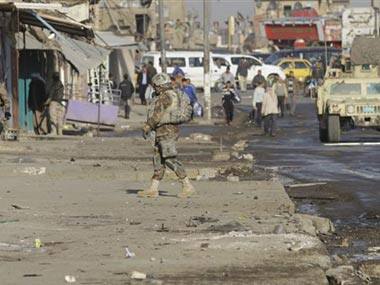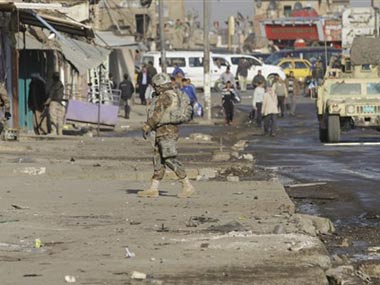Baghdad: A wave of 14 bombings ripped across Baghdad on Thursday morning, killing at least 60 people in the worst violence in Iraq for months. The apparently coordinated attacks struck days after the last American forces left the country and in the midst of a major government crisis between Shiite and Sunni politicians that has sent sectarian tensions soaring. The blasts were the worst violence to hit the country since a political crisis between Iraq’s Sunni and Shiite factions erupted this weekend. The political spat, which pits Iraq’s Shiite prime minister against the highest-ranking Sunni political leader, has raised fears that Iraq’s sectarian wounds will be reopened. The spokesman for the Iraqi health ministry, Ziad Tariq, said at least 167 people were also wounded in the attack. [caption id=“attachment_162995” align=“alignleft” width=“380” caption=“Army soldiers gather at the scene of a bomb attack in Baghdad, Iraq, 26 November, 2011. AP”]
 [/caption] Iraqi officials said at least 14 blasts went off early Thursday in nine neighborhoods around the city. The violence ranged from sticky bombs attached to cars to roadside bombs and vehicles packed with explosives. Most of the violence appeared to hit Shiite neighborhoods although some Sunni areas were also targeted. The bombings may be linked more to the US withdrawal than the political crisis, but all together, the developments heighten fears of a new round of Shiite-Sunni sectarian bloodshed like the one a few years back that pushed Iraq to the brink of civil war. The worst attack was in the al-Amal neighborhood where seven people were killed in a blast that appeared to target rescuers and officials who came to the scene after a previous explosion. At least four people were killed in one western Baghdad neighborhood when two roadside bombs exploded. All the information came from police and hospital officials who spoke on condition of anonymity because they were not authorized to speak to the media. In the southwestern neighborhood of Karrada, where one of the victims was killed, sirens could be heard as ambulances rushed to the scene and a large plume of smoke rose over the explosion site. “My baby was sleeping in her bed. Shards of glass have fallen on our heads. Her father hugged her and carried her. She is now scared in the next room,” said one woman in western Baghdad who identified herself as Um Hanin. “All countries are stable. Why don’t we have security and stability?” While Baghdad and Iraq have gotten much safer over the years, explosions like Thursday’s are still commonplace. They come at a precarious time in Iraq’s political history, just days after American troops pulled out of Iraq. The government of Prime Minister Nouri al-Maliki has accused the Sunni Vice President Tariq al-Hashemi of running a hit squad that targeted government officials. Al-Maliki is also pushing for a vote of no-confidence against another Sunni politician, the deputy prime minister Saleh al-Mutlaq. Many Sunnis fear that this is part of a wider campaign to go after Sunni political figures in general and shore up Shiite control across the country at a critical time when all American troops have left Iraq. There was no immediate claim of responsibility for the morning’s violence. But the coordinated nature of the assault and the fact that the attacks took place in numerous neighborhoods suggested a planning capability only available to al-Qaida in Iraq. Many of the neighborhoods were also Shiite areas which are a favorite target of al-Qaida. The Sunni extremist group often targets Shiites who they believe are not true Muslims. Al-Qaida in Iraq is severely debilitated from its previous strength in the early years of the war, but is still able to launch coordinated and deadly assaults from time to time. For many Iraqis and the Americans who fought a nearly nine-year war in hopes of leaving behind a free and democratic country, the events of the past few days are the country’s nightmare scenario. The fragile alliance of Sunnis and Shiites in the government is completely collapsing, large-scale violence with a high casualty toll has returned to the capital, and Prime Minister Nouri al-Maliki is displaying an authoritarian streak and may be moving to grab the already limited power of the Sunnis. US military officials have said they’re worried about a resurgence of al-Qaida after the American military leaves the country. If that happens, it could lead Shiite militants to fight back and attack Sunni targets, thus sending Iraq back to the sectarian violence it experienced just a few years ago. AP
[/caption] Iraqi officials said at least 14 blasts went off early Thursday in nine neighborhoods around the city. The violence ranged from sticky bombs attached to cars to roadside bombs and vehicles packed with explosives. Most of the violence appeared to hit Shiite neighborhoods although some Sunni areas were also targeted. The bombings may be linked more to the US withdrawal than the political crisis, but all together, the developments heighten fears of a new round of Shiite-Sunni sectarian bloodshed like the one a few years back that pushed Iraq to the brink of civil war. The worst attack was in the al-Amal neighborhood where seven people were killed in a blast that appeared to target rescuers and officials who came to the scene after a previous explosion. At least four people were killed in one western Baghdad neighborhood when two roadside bombs exploded. All the information came from police and hospital officials who spoke on condition of anonymity because they were not authorized to speak to the media. In the southwestern neighborhood of Karrada, where one of the victims was killed, sirens could be heard as ambulances rushed to the scene and a large plume of smoke rose over the explosion site. “My baby was sleeping in her bed. Shards of glass have fallen on our heads. Her father hugged her and carried her. She is now scared in the next room,” said one woman in western Baghdad who identified herself as Um Hanin. “All countries are stable. Why don’t we have security and stability?” While Baghdad and Iraq have gotten much safer over the years, explosions like Thursday’s are still commonplace. They come at a precarious time in Iraq’s political history, just days after American troops pulled out of Iraq. The government of Prime Minister Nouri al-Maliki has accused the Sunni Vice President Tariq al-Hashemi of running a hit squad that targeted government officials. Al-Maliki is also pushing for a vote of no-confidence against another Sunni politician, the deputy prime minister Saleh al-Mutlaq. Many Sunnis fear that this is part of a wider campaign to go after Sunni political figures in general and shore up Shiite control across the country at a critical time when all American troops have left Iraq. There was no immediate claim of responsibility for the morning’s violence. But the coordinated nature of the assault and the fact that the attacks took place in numerous neighborhoods suggested a planning capability only available to al-Qaida in Iraq. Many of the neighborhoods were also Shiite areas which are a favorite target of al-Qaida. The Sunni extremist group often targets Shiites who they believe are not true Muslims. Al-Qaida in Iraq is severely debilitated from its previous strength in the early years of the war, but is still able to launch coordinated and deadly assaults from time to time. For many Iraqis and the Americans who fought a nearly nine-year war in hopes of leaving behind a free and democratic country, the events of the past few days are the country’s nightmare scenario. The fragile alliance of Sunnis and Shiites in the government is completely collapsing, large-scale violence with a high casualty toll has returned to the capital, and Prime Minister Nouri al-Maliki is displaying an authoritarian streak and may be moving to grab the already limited power of the Sunnis. US military officials have said they’re worried about a resurgence of al-Qaida after the American military leaves the country. If that happens, it could lead Shiite militants to fight back and attack Sunni targets, thus sending Iraq back to the sectarian violence it experienced just a few years ago. AP
Baghdad blast: Death toll rises to 63
FP Archives
• December 22, 2011, 21:51:46 IST
The blasts were the worst violence to hit the country since a political crisis between Iraq’s Sunni and Shiite factions erupted this weekend.
Advertisement
)